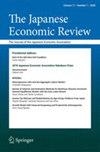奖励计划动态模型的识别
IF 0.5
4区 经济学
Q2 ECONOMICS
引用次数: 7
摘要
“常客”奖励计划通常被公司用作争夺市场份额的营销工具。它们为研究消费者的前瞻性行为提供了一个独特的环境。消费者的奖励积分积累问题可以表述为一个平稳无限视界离散选择动态规划模型。我们表明,该模型的参数,包括折扣因子,是很好的识别。特别是,它可以识别与状态相关的折扣因素(即折扣因素可以随着奖励点数的数量而变化)。我们讨论了这种识别结果与消费心理学文献中研究的目标梯度假设的关系。本文章由计算机程序翻译,如有差异,请以英文原文为准。
Identification of Dynamic Models of Rewards Programme
“Frequent-buyer” rewards programmes are commonly used by companies as a marketing tool to compete for market share. They provide a unique environment for studying consumers’ forward-looking behaviour. The consumer's problem on accumulating reward points can be formulated as a stationary infinite horizon discrete choice dynamic programming model. We show that the parameters of this model, including the discount factor, are well-identified. In particular, it is possible to identify state-dependent discount factors (i.e. discount factors can vary with the number of reward points). We discuss how this identification result is related to the goal-gradient hypothesis studied in the consumer psychology literature.
求助全文
通过发布文献求助,成功后即可免费获取论文全文。
去求助
来源期刊

Japanese Economic Review
ECONOMICS-
CiteScore
2.70
自引率
0.00%
发文量
15
期刊介绍:
Started in 1950 by a group of leading Japanese economists under the title The Economic Studies Quarterly, the journal became the official publication of the Japanese Economic Association in 1959. As its successor, The Japanese Economic Review has become the Japanese counterpart of The American Economic Review, publishing substantial economic analysis of the highest quality across the whole field of economics from researchers both within and outside Japan. It also welcomes innovative and thought-provoking contributions with strong relevance to real economic issues, whether political, theoretical or policy-oriented.
 求助内容:
求助内容: 应助结果提醒方式:
应助结果提醒方式:


